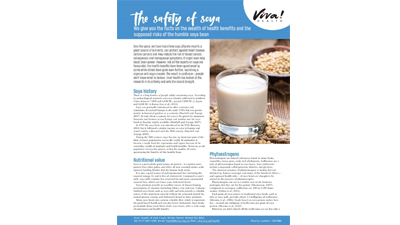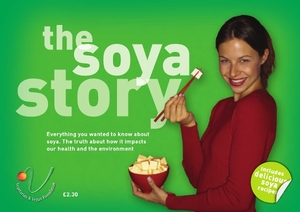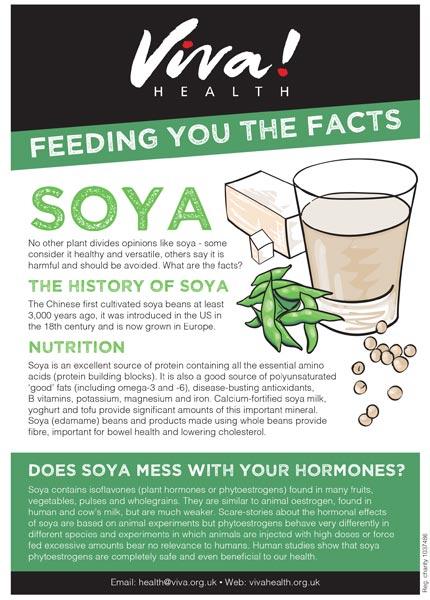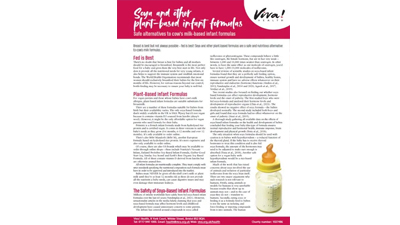Soya facts
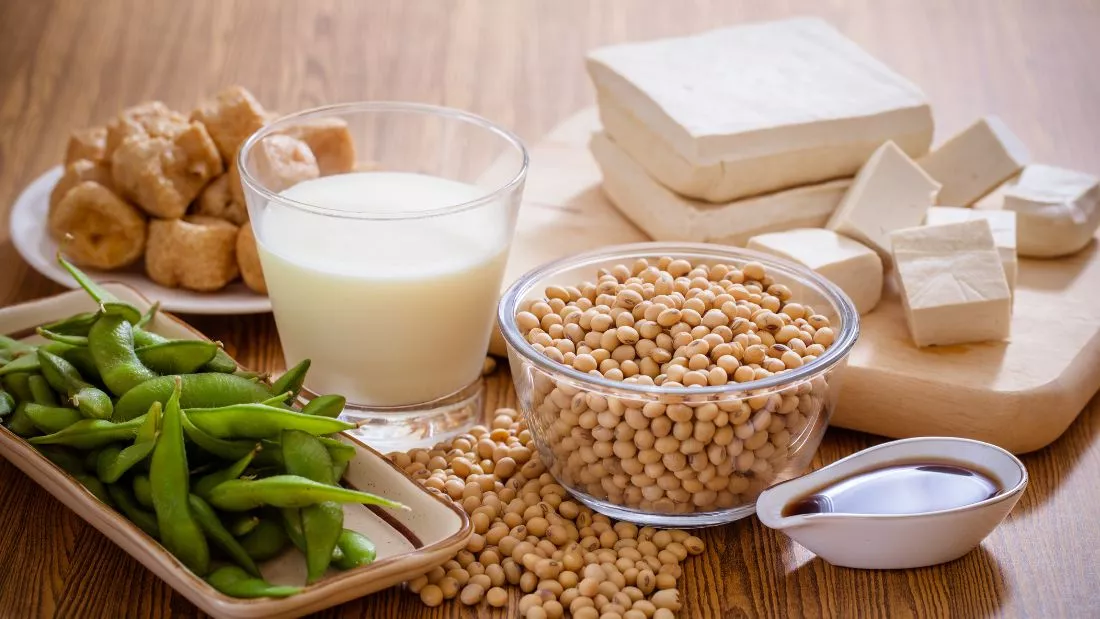
There is a huge amount of misinformation and downright daftness about soya which is why Viva! Health has launched this website dedicated to informing and myth-busting.
Viva! Health get more nutritional enquiries about soya than any other subject! Nearly every day someone emails or telephones Viva! Health to ask if soya is safe, is it healthy, can it harm children? Will it feminise boys? Does it contain hormones? Our soya fact sheets are used for health food shop staff training and have been requested by a leading soya milk manufacturer to hand out at public talks.
Viva! Health examines the latest science on soya. We give you the facts on the wealth of health benefits and the supposed risks of the humble soya bean
Over the last few years we have heard how soya is a very good source of nutrients and can protect against heart disease, certain cancers and may reduce the risk of osteoporosis and menopausal symptoms; it might even help to boost brain power. However, not all reports on soya are favourable; the health benefits have been questioned by some while others have gone even further, launching a vigorous anti-soya crusade. The result is confusion – people don’t know who to believe. Viva! Health has looked at the research in its entirety and sets the record straight. Click here to download it.

Describes the nutritional benefits of soya foods, the wide range of health benefits and the environmental impact of soya farming. Also features a wide range of tasty, inventive recipes from miso soup to chocolate mousse. Contains useful information about soya foods that will both inform and reassure you that soya is a healthy, nutritious and safe food for people of all ages. Click here to read it.
Safe alternatives to cow’s milk-based infant formulas
Breast is best but not always possible – fed is best! Soya and other plant-based formulas are a safe and
nutritious alternative to cow’s milk formulas. Click here to download it.
Soya farming is devastating the Amazon and other lands, but where does all the soya go? It’s not for human consumption.
Soya has been the victim of its versatility, good nutrition value and relatively easy cultivation. Native to Asia, it’s been a part of the human diet for millennia but since the boom of large scale animal farming, people discovered it’s cheaper to raise livestock on soya-based feed as it’s high in protein and contributes to faster growth than other types of feed. But this ever increasing hunger of the animal farming industry is destroying the planet.
Between 75 and 80 per cent of the world’s soya production is fed to livestock so that people can eat meat, eggs and dairy (Climate Focus, 2019; Bambridge-Sutton, 2023). In the US, 90 per cent of soya is used for animal feed (American Soybean Association, 2024).
Nature and our health would benefit greatly if more people ate soya instead of animal products as less soya would have to be grown overall. What’s more, most of the soya for human consumption in Europe is also grown in Europe, sustainably and without genetic modification. If you want to be 100 per cent sure of no genetic modification in your soya product, look for certified organic products.
PS How about deforestation claims?
Whilst some companies have made ‘no deforestation’ commitments (relevant mostly to South America where soya for animal feed is grown), these do not necessarily protect other biomes like savannahs and grasslands which are being cleared for soya, and they do not address other important issues related to responsible soya production such as social or other environmental impacts.
Over the years, soya production on the existing fields has intensified and land is still being cleared – just not to produce soya. Large areas of land are now used for cattle farming as the fast growing grass on deforested land is ideal food for grazing cattle and the industry is booming. Hand in hand with this beef industry expansion comes further environmental destruction, worker’s rights abuse and invasion of Indigenous Lands.
In January 2025, we contacted main soya food manufacturers to ask about their soya sourcing policies and these are their replies:
(Supermarkets that are not on the list had no way of contacting them for general enquiries.)
| Company | Soya origin and policies |
|---|---|
| Aldi | No reply |
| Alpro | Not one of our beans comes from the Amazon or any other rainforest. All our soya is non-GMO. 100% of our organic beans and the majority of our conventional beans are grown in Europe (mostly France). The rest we get from Canada. To lighten our carbon footprint we ship them across the Atlantic by boat. No planes + fewer miles = less CO2!We also work with farmers to promote good farming practices – like including soya beans in their crop rotation to keep nitrogen in the soil, so that less fertilizer is needed. Plus, all our beans can be tracked from seed to serve. Our system is audited and certified according to the ProTerra standard by the independent organization, Food Chain ID and we know where every bean has been. |
| ASDA | No reply |
| Blue Dragon | No reply |
| Bonsoy | No reply |
| Bute Island Foods (Sheese) | All our products are non-GMO. The soya used in our products is all from a sustainable source and we have written assurance from all suppliers that RTRS credits are used to ensure the sustainability.We use soya in our Sheese spread which comes from an IP source (identity preserved). The IP system is used to trace the soya from seed, all the way through the production process and is used to ensure that the soya is GMO-free as well as the best quality. We only source the highest quality, clean, dehulled soya bean seeds to use in Sheese. |
| Cauldron | The soya beans we use in our product range are organic and certified against one of these standards: Proterra Foundation, Basel Criteria for Responsible Soy Production or Europe Soya StandardWe support zero deforestation practices and all Cauldron tofu is GMO-free. |
| Clearspring | Currently, 99% of the soya in our products is organically grown. This will be going up to 100% in 2025 as our last remaining products containing non-organic soya have either been reformulated to be organic or will be discontinued.While the soya in our products is sourced from around the world, we have a strict non-GM policy and we have some key product lines that are made with European sourced soya, e.g. Soya Chunks and Soya Mince. None of our soya comes from deforested areas. |
| Co-op | Our ambition is that all soy used in Co-op products, including embedded in animal feed, will be deforestation and conversion free (with a cut-off date of 2020) and responsibly sourced by the end of 2025. We were a founding signatory of the UK Soy Manifesto (UKSM), which aims to ensure all physical shipments of soy to the UK are deforestation and conversion free by 2025 at the latest. |
| Fry's | No reply |
| Granovita | No reply |
| Holland and Barrett | Our soya products do not contain any genetically modified ingredients. |
| Iceland | Iceland generally avoids using GM ingredients in our products. Iceland is committed to sustainable sources practices. This includes ensuring that our suppliers adhere to sustainable farming practices to minimize environmental impact. Iceland also offers a range of organic products. |
| Lidl | Lidl is committed to sourcing 100% of its critical raw materials from verified sustainable sources by 2025. Since September 2018, Lidl has purchased RTRS certificates annually through the ‘Book and Claim Direct Trade’ approach to cover 100% of its soy footprint. We are now working with our suppliers to transition to verified deforestation and conversion (vDCF) free soy by 2025.We have committed to sourcing the soy used in our Vemondo (vegan and vegetarian) range from low risk deforestation and land conversion areas, meaning it must be from European sources and certified to Donau Soja or Europe Soya standards. |
| Linda McCartney | We recognise the part that we play in responsible soya procurement and, as a result, we have ensured the soya we use directly in our products is non-GM; and we do not and will not source any of our soya from South America which is the main area of concern for deforestation. We currently source our soya from North America, Serbia, India and China. Each of our suppliers have a no deforestation policy in place and we are confident that our suppliers source sustainably. |
| Marks & Spencer | To help tackle the challenge of deforestation seen as a result of soy production, we are working to ensure 100% of soy we use in our products is sourced from verified deforestation and conversion-free supply chains by the end of 2025. |
| Morrisons | No reply |
| Plamil | No reply |
| Plenish | No reply |
| Provamel | No reply |
| Rude Health | We source our soya exclusively from Europe (Italy and France) Therefore there is no risk that it comes from deforestation. In Europe it is also not allowed to grow GMO crops, therefore we can guarantee that our soya is not genetically modified. |
| Sojade | The soybeans we use are of French origin, grown mainly in the southwest, east and south of France, by producers with whom we have developed a real partnership. Thus, the establishment of the Sojade subsidiary allows us to have complete control: traceability, seed guarantee, guarantee of our ingredient suppliers, analysis of raw materials, analysis of finished products... and it also allows us to certify that all Sojade products comply with regulatory requirements. The Sojade range is made from non-GMO soybeans. Our production plant is located in Brittany, in the town of Châteaubourg (Ille & Vilaine) and the soybeans travel by truck. The law requires the labelling of GMOs above 0.9%. Below this percentage, no mention is necessary. Our company goes further since it guarantees a non-GMO product, that is to say without traces of GMO. This guarantee is possible thanks to numerous controls, from the seed to the finished product, including the harvest of the grains. Indeed, all the analyses carried out are carried out by independent laboratories. |
| Soyatoo! & Viana (Tofutown) | No reply |
| Taifun | We would only use GMO-free, organically grown soybeans for our tofu. Our soybeans come from Germany, Austria and France. |
| Tofoo | Our soya beans have to be from a sustainable source, must always be organic and of course GM free too. This is our bean guarantee. Our beans are grown in Canada, China and Europe and shipped to us in the UK. We are always on the lookout for sources closer to home, but we will only ever buy great tasting, salute worthy, sustainable beans. |
| Tofutti | No reply |
| V-Bites | No reply |
| Vive Soy | No reply |
| Waitrose | Soya used directly in our products, such as soya milk, makes up less than 1% of our business’ total soya footprint. We buy Roundtable on Responsible Soya (RTRS) credits to cover this portion of our footprint which are a vital tool to support and incentivise farmers to produce soya responsibly. |




